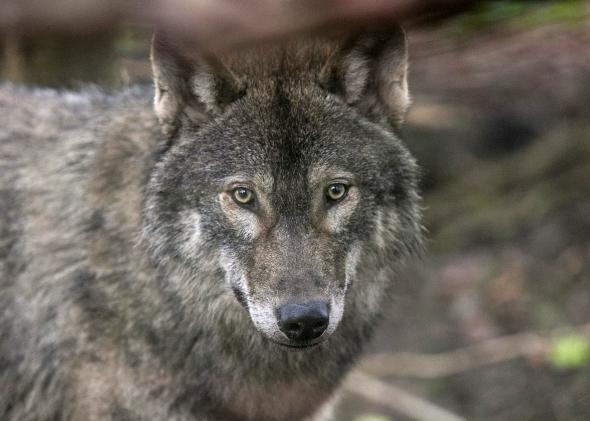
Photo by Matt Cardy/Getty Images
Of all the myths that dog the wolf, none is more widely accepted than
the idea that wolves howl at the moon. Images of wolves with their
heads upturned, singing at the night sky, are as unquestioned as a
goldfish’s three-second memory or a dog’s color-blindness (both also
myths). There are countless depictions of moon howling in faux Native American tchotchkes; the scene also appears in Jack London novels and at least one Los Angeles piano bar. This curious fiction has become so quotidian that even The New Yorker’s legendary fact checkers let “a long, lamenting howl at the orange moon” slide into print without a second thought.
The truth is that wolves—the real-life, Canis lupus
variety—don’t howl at the moon. Scientists have found no correlation
between the canine and Earth’s satellite, except perhaps an increase in
overall activity on brighter nights. So how did the idea gain such
traction, and what do wolves howl at?
“There has been more speculation about the nature and function of the
wolf’s howl than the music, probably, of any other animal,” writes
Barry Lopez in his extraordinary book Of Wolves and Men.
Hearing a howl in the wild—or howls, because wolves harmonize with one another—is a startling experience. Howling rises and falls in pitch, skirting the edges of human music like a men’s choir fed through a synthesizer. Because the sound is both familiar and alien, it seems uncanny—attractive and repulsive at the same time. If animal noises are “music,” as Lopez suggests, then wolves are the Angelo Badalamenti of the animal kingdom. The howl seems engineered to give you the creeps.
Hearing a howl in the wild—or howls, because wolves harmonize with one another—is a startling experience. Howling rises and falls in pitch, skirting the edges of human music like a men’s choir fed through a synthesizer. Because the sound is both familiar and alien, it seems uncanny—attractive and repulsive at the same time. If animal noises are “music,” as Lopez suggests, then wolves are the Angelo Badalamenti of the animal kingdom. The howl seems engineered to give you the creeps.
Biologists have identified a surprisingly wide range of possible
functions: Wolves howl to assemble their pack, attract a mate, mark
territory, scare off enemies, signal alarm, or communicate their
position. Sometimes they howl when they wake up in the morning, like
humans yawning during a stretch. It’s even been suggested that wolves
howl to confuse enemies and prey. Traveling on horseback in Texas, Gen.
Ulysses S. Grant once heard howling and figured there were 20 wolves; it
turned out there were only two. “Seated upon their haunches,
with their mouths close together, they had made all the noise we had
been hearing for the past 10 minutes,” he wrote in his memoir.
But even more interesting, I think, are the emotional rationales that
have been put forth for howling—that it expresses restlessness,
anxiety, stress, frustration, loneliness, and excitement. The more I
learn about wolves, the more complex and human-like they seem to become
(or, conversely, the more wolf-like we become). Recent research
has found that wolves howl most frequently to the members of their
packs they spend the most time with. That sounds an awful lot like best
friends chatting about their day.
This is an eclectic list of functions (and it doesn’t even include my favorite: because they like to
howl), but in no case is the moon involved as a motivating factor. So,
again, where does the myth come from? Lopez offers a compelling theory
here: “Howling reaches a seasonal peak in the winter months, during the
time of courtship and breeding; it is easy to see how the idea that
wolves howl at the moon might have gained credence and played well on
the imagination during these cold, clear nights when the sound carried
far and a full moon lent an eerie aspect to a snowscape.” This reminds
me of the “wolf moon” of January, a name given to the full moon
supposedly, and perhaps apocryphally, because of the hungry packs that
once gathered outside Native American villages.

Photo by NIKOLAY DOYCHINOV/AFP/Getty Images
But the association of wolves with the moon has developed over
centuries and in many other parts of the world. In Norse mythology, the
descendants of Loki (the trickster god of Thor fame) were
wolves prophesied to eventually devour the moon and sun. Even earlier,
in Roman antiquity, Pliny the Elder recorded a skeptical account of
lycanthropy in his Natural History.
Perhaps because the wolf has spent so long being framed as something
demonic and evil, and with evil indelibly linked to the night, flights
of association have hardened into truism. Gothic fiction certainly
kicked things along a bit. It’s really no wonder we’re confused today.
Nevertheless, knowing the truth doesn’t mean we can’t still
appreciate the fun of an image so loaded with romantic symbolism it can
cause a terrible T-shirt to become a viral sensation. Our understanding of wolves has always blended biology with human projection. As Aldo Leopold wrote, “only the mountain has lived long enough to listen objectively to the howl of a wolf."
source
source

No comments:
Post a Comment